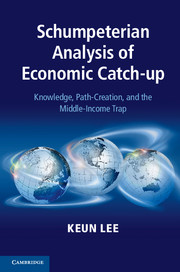Book contents
- Frontmatter
- Contents
- List of Figures
- List of Tables
- Foreword
- Preface
- Part I Introduction and perspectives
- Part II Empirical analysis at three levels
- 3 Knowledge and country-level catch-up
- 4 Knowledge and sector-level catch-up: Asia versus Latin America
- 5 Knowledge and firm-level catch-up: Korean versus US firms
- Part III Toward a theory and how to escape the trap
- Part IV Technological turning points and conclusion
- Appendix tables
- Notes
- Bibliography
- Index
4 - Knowledge and sector-level catch-up: Asia versus Latin America
from Part II - Empirical analysis at three levels
Published online by Cambridge University Press: 05 June 2014
- Frontmatter
- Contents
- List of Figures
- List of Tables
- Foreword
- Preface
- Part I Introduction and perspectives
- Part II Empirical analysis at three levels
- 3 Knowledge and country-level catch-up
- 4 Knowledge and sector-level catch-up: Asia versus Latin America
- 5 Knowledge and firm-level catch-up: Korean versus US firms
- Part III Toward a theory and how to escape the trap
- Part IV Technological turning points and conclusion
- Appendix tables
- Notes
- Bibliography
- Index
Summary
Introduction
The analysis of technological catch-up at the sector level in this chapter relies on the concept of the technological regime by Nelson and Winter (1982: 258). Technological regimes are perceived as a combination of several dimensions, such as technological opportunity, appropriability of innovations, cumulativeness of technological advances, and properties of the knowledge base. Although this notion of technological regime has been used to explain the specific way in which the innovative activities of a technological sector are organized in many advanced economies, Lee and Lim (2001) use this concept in the context of catching up by latecomers in technological capability building. The econometric study of Park and Lee (2006) is one of the first attempts to generalize the finding from many case studies of catch-up. Their study finds that different elements of technological regimes of sectors affect the catching-up performance of a country differently. Their study and this study analyze the patent data at the levels of technological classes, so using the term “classes” to refer to the analysis is more precise. However, the term “sector” is more commonly used than classes, and using “technological sectors” in place of classes is appropriate as long as we place the word “technological” before “sectors” to distinguish them from industrial sectors. Hereafter, we will use the term “technological sectors” in place of the more precise term “technological classes.”
Although Park and Lee (2006) examine the case of the two most successful economies of Korea and Taiwan, this chapter aims to encompass more countries to determine whether differences exist between these next-tier countries and the first-tier countries of Korea and Taiwan. The focus will be on four Asian (i.e. China, India, Malaysia, and Thailand) and four Latin American countries (i.e. Brazil, Argentina, Mexico, and Chile), because some of them are perceived as innovative developing countries by the literature (Morel et al. 2005). This comparison will determine whether the variable of cycle time of technologies, which is most important in the cases of Korea and Taiwan, has the same or a different degree of explanatory power as the determinants of catch-up across different groups of latecomer economies.
- Type
- Chapter
- Information
- Schumpeterian Analysis of Economic Catch-upKnowledge, Path-Creation, and the Middle-Income Trap, pp. 72 - 100Publisher: Cambridge University PressPrint publication year: 2013



